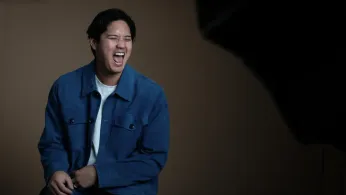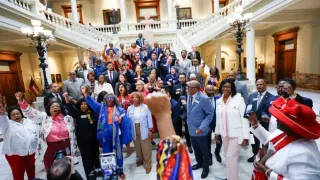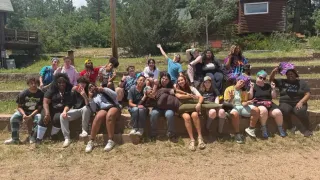
Dec 9
Shohei Ohtani Is the AP's Male Athlete of the Year for Record-Tying 4th Time
Beth Harris READ TIME: 5 MIN.
Shohei Ohtani is catching up with more legends.
The baseball superstar ends 2025 by winning The Associated Press Male Athlete of the Year for the fourth time, tying him with Lance Armstrong, LeBron James and Tiger Woods for most among male honorees.
“Receiving this award multiple times is something truly special,” Ohtani said in Japanese in an exclusive interview with the AP.
Ohtani received 29 of 47 votes in balloting among sports journalists from the AP and its members after his two-way dominance culminated in a repeat World Series title for his Los Angeles Dodgers – delivering perhaps the greatest single-game individual performance in sports history along the way. He previously won the award in 2024, his first season with the Dodgers, and in 2023 and 2021, when he was with the Los Angeles Angels.
The AP honor has been given out since 1931. Multisport standout Babe Didrikson Zaharias won six times over the 1930s, ’40s and ’50s, the most by a man or woman.
The ultra-competitive Ohtani’s latest win broke a tie with Michael Jordan, who along with Woods, he followed while growing up in Japan.
“Last year, I said I wanted to win this award again, and I will work hard so that I can win it again next year as well,” he said.
Swedish-American pole vaulter Armand Duplantis, who won his third consecutive world title and has set the world record 14 times, including four times in 2025, was second with five votes in balloting announced Tuesday. Carlos Alcaraz, the world’s top-ranked tennis player who won titles at the French and U.S. Opens, was third with four.
The AP Female Athlete of the Year will be announced Wednesday.
Ohtani has shown remarkable consistency since joining the Los Angeles Dodgers on a then-record $700 million, 10-year contract in December 2023.
He won his fourth career Most Valuable Player award (second with the Dodgers) by unanimous vote, the first player in major league history to do so.
This year, he posted a 1.014 OPS and hit 55 home runs. Returning to the mound for the first time since 2023, he had a 2.87 ERA and 62 strikeouts in 47 innings over 14 starts.
Ohtani saved his best for the postseason.
In Game 4 of the National League Championship Series against the Milwaukee Brewers, he pitched six scoreless innings with 10 strikeouts and hit three home runs to earn MVP honors. He said it was his greatest game in a career full of incredible feats.
“If you think about it in terms of a single game, I’d say that’s probably true,” he said. “It was a crucial game in the postseason, and I personally feel I played quite well in that game.”
Does he surprise himself?
“Well, yes, there are times when I feel that way about myself, and of course there are times when I think I’m not good enough,” he said, “so I suppose athletes experience both kinds of feelings.”
Ohtani showed he’s human in Game 7 of the World Series. He singled in the first inning and then took the mound on short rest, but he struggled with his command. He gave up a three-run homer to Toronto’s Bo Bichette along with five hits in 2 1/3 innings.
But he and the Dodgers raised a second straight World Series trophy after outlasting the Blue Jays in the most scintillating Series in recent memory.
“Shohei obviously has the weight of the world on his shoulders as far as expectations, being probably the face of baseball, certainly when you’re talking about the world,” Dodgers manager Dave Roberts said after Game 7. “It’s just really special what he’s done. Just a great person and a great competitor.”
Ohtani’s presence has been transformative for MLB’s global reach. Game 7 of this World Series averaged 13.1 million viewers in Japan, the most-watched World Series game on a single network there ever, and 51 million watched worldwide to make it the most-viewed since Game 7 of the 1991 World Series.
“I think the higher your goals are, the more you have to do, and the more you want to do,” he said. “If you’re satisfied with where you are now, I don’t think it’s possible to achieve your goals without putting in the effort. So, setting goals high is what I believe is most important.”
The Dodgers carefully managed Ohtani’s return to pitching this year by gradually increasing his workload after rehabbing from elbow surgery in September 2023. His innings were initially capped before he was allowed to make longer starts as he felt better.
“When it comes to feeling nervous, being on the mound definitely makes me more tense,” he said. “It’s a position where you can single-handedly ruin a game, and at the same time, it’s also a position where you can contribute to a win. So, in my mind, I feel that being a pitcher is truly a special role.”
At 31, Ohtani has undergone three major surgeries: two on his right elbow and another on his left shoulder. Regardless of the physical and mental wear and tear, he plans on remaining a two-way player his entire career.
“I think it’s best to keep doing it right up until the moment I retire,” he said.
Ohtani plans to play for Japan in the World Baseball Classic in March.
“I’m still not sure whether I’ll be pitching,” he said. “I’ve been given permission to play in the tournament, but as for how much and in what way, including on the batting side, that’s something we’ll be discussing.”
Winning a third consecutive World Series championship is among Ohtani’s biggest goals in 2026.
“Staying healthy and appearing in every game without injury, that’s the smallest goal I have,” he said.
Ohtani became a father for the first time when his wife, Mamiko Tanaka, gave birth to their daughter in April. He carefully guards against revealing her name and any details about his home life. No word on how his beloved dog Decoy reacted to having a new sibling, either.
Ohtani’s American fans enjoy hearing him speak English on the rare occasions he’s done so publicly, including at both World Series celebrations. He understands most of the language, although he uses an interpreter in interviews.
“I think it would be best if I could speak in English, so even if it’s just small steps, I want to keep working at it,” he said. “Whether it’s with fans or in different situations, being able to speak directly in English might help bridge the gap between us.”
In the meantime, he’ll keep letting his bat and arm speak volumes.






